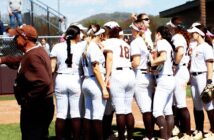Imagine you are a star wrestler at Lehigh. You came to this school on a full scholarship, and you rely on that funding to be able to continue your education here.
One day, you get a call from The Goose. They want you to participate in a series of commercials that would run in the Lehigh Valley, hoping your name recognition as an accomplished athlete in the area would cause more people to patron the deli.
The Goose’s owner, Tony Silvoy, says he’ll provide you with fair compensation for your time and royalties for the advertisements themselves.
You are excited about this opportunity, but you feel concerned at the same time. As an NCAA athlete, are you legally allowed to star in a commercial and receive compensation based on your name, image and likeness?
This used to be a real concern for athletes, but as of July 2021, the NCAA released an interim NIL policy that allows college student-athletes to be paid for opportunities that rely on their star power as a player.
The new policy is set to remain in place until either the NCAA provides a new set of rules or Congress passes federal legislation to regulate how the NCAA can compensate its athletes.
Moving toward allowing student-athletes fair pay is undoubtedly a step in the right direction for the country, but it can also create problems for mid-size schools with comparatively smaller athletics budgets like Lehigh.
While none of the proposed NIL laws would allow players to receive direct compensation for their on-field achievements, new NIL laws could create a financial incentive for athletes to choose to play for bigger schools in bigger cities.
No matter how many sponsorships a Lehigh player receives from The Goose, Molly’s, Rakki Ramen or any other local business, they will not be able to compete with athletes in bigger markets who are able to reach out to larger companies to grow their brand.
For example, according to NIL tracking website on3.com, the breakout stars of this year’s Women’s NCAA March Madness Tournament, Caitlin Clark of Iowa and Angel Reese of LSU, each made more than half a million dollars from brand deals over the course of the tournament.
Income from college sports has become so great that Reese told reporters she’s “in no rush” to declare for the WNBA draft. “The money I’m making is more than some of the people that are in the league that might be top players,” Reese said.
Reese is right in her assessment. The average WNBA salary in 2022 was $102,751, while the highest-paid athletes had salaries of $228,094 — less than half of what Reese and Clark are making in college.
How does this recent uptick in NIL deals affect Lehigh’s ability to land high-quality players?
Well, in some sports, it won’t make too much of a difference.
Despite our impressive win over Duke (which was definitely not a fluke), no five-star basketball recruit is going to choose to come to Lehigh when they have the opportunity to play for Gonzaga, UCONN, UNC or any other big basketball school, regardless of new NIL rules.
However, sports like wrestling, in which Lehigh is highly competitive, may begin to see negative impacts to these new financial incentives.
Schools that don’t have wrestling programs as successful as ours but have the money and resources to create one and are located in a city with a big market can begin to use their financial resources to draw athletes away from Lehigh.
The financial opportunities for college athletes are further complicated by the emerging presence of crowdfunding apps that allow students to directly support athletes.
Last August, the company Booster Athletes launched a subscription-based social media app where fans can pay to receive exclusive behind-the-scenes photo and video content from their favorite student-athletes.
This model caters to athletes at big universities with a school culture revolving around athletics — something Lehigh doesn’t have.
We should point out that many of the grievances we have with these new models for paying college athletes may come from a slightly unfair perspective — we are Lehigh students who want to see the best for Lehigh athletics. These changes will be a good thing for the athletes they are designed to help, regardless of the impact it may have on schools like Lehigh.
The world of NIL law is confusing and changing every day, so much so that the information here might be outdated by the time it is published.
We will support any action that helps ensure student-athletes are given fair pay for the work they do, so long as protections are put in place for small schools so they can continue to compete.






Comment policy
Comments posted to The Brown and White website are reviewed by a moderator before being approved. Incendiary speech or harassing language, including comments targeted at individuals, may be deemed unacceptable and not published. Spam and other soliciting will also be declined.
The Brown and White also reserves the right to not publish entirely anonymous comments.